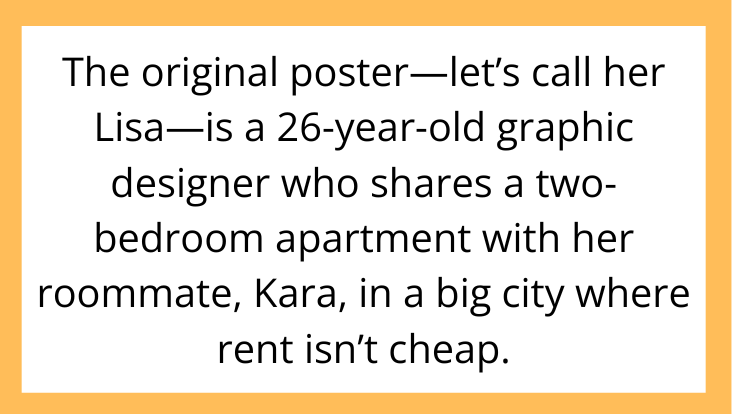AITAH for Asking My Roommate to Pay More Rent Because Her Boyfriend Basically Lives Here?
Living with roommates can be challenging enough—throw in an unofficial third occupant, and things can get downright tense. In today’s AITAH story, one renter decided enough was enough when her roommate’s boyfriend started spending every night at their apartment without paying a dime.
Was she standing up for fairness—or overstepping?
Let’s dig into the details.
The Situation: When One Roommate Becomes Two

The original poster—let’s call her Lisa—is a 26-year-old graphic designer who shares a two-bedroom apartment with her roommate, Kara, in a big city where rent isn’t cheap.
From the beginning, the lease was clear: just the two of them splitting rent and utilities 50/50. Everything was fine for the first six months—until Kara started dating Brian.
At first, Brian was over a couple of nights a week. But slowly, “a couple” turned into every single night. Lisa noticed Brian was showering in their bathroom daily, cooking meals, and even getting packages delivered to the apartment.
Eventually, Lisa felt like she was living with a couple rather than a roommate.
The Breaking Point: The Utility Bills Skyrocket

Lisa tried to be patient. She knew relationships evolve, and she didn’t want to seem uptight or petty. But when their utility bills nearly doubled, she decided to speak up.
She approached Kara and calmly explained that she felt it was unfair to keep splitting everything 50/50 when Brian was clearly using the apartment as his primary residence. She suggested that Kara either:
-
Ask Brian to contribute financially, or
-
Have Brian limit his overnight stays to no more than two nights per week.
Kara was stunned—and furious.
“You’re acting like a landlord instead of a friend,” she snapped. “It’s not like he officially lives here. You’re just being controlling.”
Lisa felt guilty but also frustrated. She posted to Reddit to ask: AITAH for expecting my roommate’s boyfriend to contribute financially when he’s basically living here?
Reddit’s Verdict: Who’s in the Wrong?

Thousands of commenters quickly jumped in, and the consensus was clear: Lisa was not the villain.
Here’s why:
-
Fairness: If someone uses the apartment daily, it’s only fair they contribute to costs.
-
Boundaries: Lisa wasn’t telling Kara who she could date—just that it shouldn’t impact her financially.
-
Utilities and Wear & Tear: More people mean more usage—higher bills, more cleaning, more strain on shared spaces.
One popular comment summed it up perfectly:
“If it walks like a roommate, talks like a roommate, showers like a roommate—it should pay like a roommate.”
The Other Side: Kara’s Perspective

While most supported Lisa, a few Redditors sympathized with Kara:
-
Financial Strain: Maybe Brian couldn’t afford rent and Kara didn’t want to make him feel unwelcome.
-
Relationship Dynamics: Kara might feel Lisa’s complaint was a judgment about her relationship.
-
Gray Areas: Without clear guidelines, overnight guests can be a tricky topic.
Still, even those who empathized admitted Kara should have had an honest discussion about how often Brian stayed over and how that affected shared expenses.
Setting Boundaries Without Starting World War III

If you ever find yourself in Lisa’s shoes, here are some strategies to handle it:
1. Use Facts, Not Emotions
Stick to specifics—how much utilities have increased, how often he’s over—and avoid making it personal.
2. Suggest Reasonable Solutions
Offer clear options, such as limiting overnights or having the guest contribute to shared costs.
3. Put It in Writing
Update your roommate agreement. Many leases explicitly limit how many nights a guest can stay.
4. Be Prepared for Pushback
Some people don’t like having boundaries enforced. Stay calm and stand your ground.
Why This Scenario Resonates

So many people related to Lisa’s post because it taps into a universal truth: clear expectations make shared living manageable. When one person blurs those lines, resentment builds quickly.
It’s not controlling or petty to ask for fairness. In fact, ignoring the issue can ruin a friendship faster than an uncomfortable conversation ever will.
Final Thoughts: You’re Not the Villain for Wanting Fairness

Lisa wasn’t trying to ban Brian from the apartment. She wasn’t trying to micromanage Kara’s life. She simply didn’t want to pay extra because someone else was living rent-free.
Setting boundaries isn’t villainous—it’s respectful to everyone involved.


